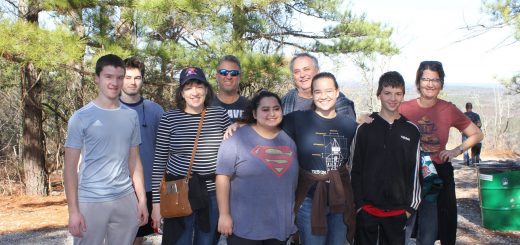For You, For Them, For Us!
“For You, For Them, For Us!” – December 10th, 2023 (Luke 2)
Luke 2:1-5 (NRSV) – “1 In those days Caesar Augustus issued a decree that a census should be taken of the entire Roman world. 2 (This was the first census that took place while Quirinius was governor of Syria.) 3 And everyone went to their own town to register. 4 So Joseph also went up from the town of Nazareth in Galilee to Judea, to Bethlehem the town of David, because he belonged to the house and line of David. 5 He went there to register with Mary, who was pledged to be married to him and was expecting a child.”
Former Director of the U.S. Census Bureau, Kenneth Prewitt, wrote, “Mention the word ‘census,’ and what comes to mind is a dull counting project that the government carries out from time to time.” In the U.S. today, it takes less than 10 minutes to complete the regular census form. Despite the threat of fines, many are reluctant to responsibly fill out census forms. Similar scenarios occur around the world. In New Zealand in 2001, 1.5% of the population listed “Jedi” as their religion, in protest of the question itself. Who likes invasions of privacy or the imposition of taxes?
Luke chapter 2 opens with a seemingly mundane reference to a census, yet swiftly pulls us into the unfolding drama. About 30 years earlier, Caesar Augustus had ushered in the pax Romana, a hyped-up headline that promised peace and order but failed to deliver over the ensuing two hundred years. Roman historian Tacitus characterized the era as “violence, robbery, and rapine they give the lying name of ‘government’; they create a desert and call it ‘peace.’” Imagine what it would have been like to live in the Roman province of Judaea during this census, the purpose of which was to collect more taxes. Each taxable property was to be recorded, along with its value and the owner’s name. Although Joseph was a resident of Nazareth, the fact that he went back to Bethlehem shows us that he must have still held some property there in his hometown. The 90 mile journey was long and laborious, taking them through difficult and dangerous territory, putting both Mary and her baby at risk on rough roads, whether they walked or rode on a donkey. As the property owner, only Joseph would have been required to register – he could have traveled alone. But since the circumstances of Mary’s pregnancy almost certainly deprived her of the support network she would have surely needed, it is very likely that Joseph brought her with him precisely because she was in the late stages of her pregnancy. Can we take a moment to admire and appreciate both the courage and the care that Joseph showed Mary by journeying with her through it all?
Luke 2:6-7 (NRSV) – “6 While they were there, the time came for the baby to be born, 7 and she gave birth to her firstborn, a son. She wrapped him in cloths and placed him in a manger, because there was no guest room available for them.”
Just like that, Jesus was born! We are not given any other details here, but it is likely that a midwife would have assisted in the delivery, a normal practice at that time. Perhaps the midwife provided the cloths, traditional strips of fabric used to keep babies’ limbs straight to help them to grow properly.
And then we come to a pretty shocking statement, one that has become normalized because we’ve seen countless depictions of it on Christmas cards. She “placed him in a manger.” A manger is a feeding trough in a stable or barn from which horses or cattle eat. We have three outdoor cats who are impeccable groomers but somehow manage to make their food and water bowls very dirty every single day. Mary placed Jesus in a manger. This is Mary, whom the angel had said, “Greetings, favored one! The Lord is with you.” This is Mary, who carried and had now given birth to Jesus. Mary had the most astounding pregnancy and birth in recorded human history! And she placed him in a manger. The one whose reign and kingdom would last forever was placed in a manger. Tamera introduced us to a Phil Wickham song last week whose lyrics phrase this so beautifully: “You could have marched in all Your glory into the heart of Rome. Showed thеm splendor like they’d nеver known. But You wrote a better story in humble Bethlehem. Glory be to You alone – King who reigns from a manger throne.”
In Bethlehem, as in any small town, news would have traveled fast. Luke tactfully tells us not that “no guest room was available,” but that “no guest room was available for them.” It’s interesting how often the word “hospitality” or “hospitable” crop up in Scripture. We are instructed to generously offer hospitality to one another and to prudently show hospitality to strangers. Hospitality is included as a qualification for receiving financial relief and for church leadership. We are to gratefully accept the gift of hospitality offered to us. Jesus says, “I was a stranger and you welcomed me,” equating how we treat him with how we treat others. How easy it is to judge others based on outward appearances. No guest room was available for Joseph and Mary, for them, because they were judged to be despised, excluded, forgotten.
Luke 2:8-15 (NRSV) – “8 And there were shepherds living out in the fields nearby, keeping watch over their flocks at night. 9 An angel of the Lord appeared to them, and the glory of the Lord shone around them, and they were terrified. 10 But the angel said to them, ‘Do not be afraid. I bring you good news that will cause great joy for all the people. 11 Today in the town of David a Savior has been born to you; he is the Messiah, the Lord. 12 This will be a sign to you: You will find a baby wrapped in cloths and lying in a manger.’ 13 Suddenly a great company of the heavenly host appeared with the angel, praising God and saying, 14 ‘Glory to God in the highest heaven, and on earth peace to those on whom his favor rests.’ 15 When the angels had left them and gone into heaven, the shepherds said to one another, ‘Let’s go to Bethlehem and see this thing that has happened, which the Lord has told us about.’”
When we read through the Bible, we might conclude that because Moses the Lawgiver had been a shepherd for 40 years and because King David had been a shepherd in his youth, that shepherding would have been held in high esteem in first century Judaea. Unfortunately, shepherds occupied the lowest rung of the social ladder at that time, alongside tax collectors and dung sweepers. Their testimonies were worthless in court, and they were not welcome to participate in social or religious life. Yet it was to this despised, excluded, and forgotten group that the angel of the Lord appeared.
As Allen told us last week, the first thing angels often said when appearing to someone was, “Do not be afraid.” And that’s exactly what happened in Luke 2. When we think of shepherds watching over their flocks, we might imagine idyllic scenes of contented sheep grazing peacefully in green pastures near a babbling brook. The sun is shining, the breeze is gentle, the lambs are frolicking, the birds are chirping, and all is well with the world. Luke tells us that these shepherds were “keeping watch over their flocks at night.” There’s no need to keep watch in an idyllic scene. But these shepherds were very much in touch with the real world. They knew that when the sun went down, they needed to watch out for and deal with the “night-shift” animals: wolves, hyenas, panthers, jackals, lions, and bears. On the rare occasions when I’ve wandered around in nature at night, I’ve been startled by every silhouette and sound. But these shepherds were not easily frightened. Now the angel of the Lord appeared to them, the glory of the Lord shone about them, and they were terrified. The three Greek words used there literally mean, “they feared with great fear.” For seasoned and stalwart sheep herders to be terrified tells us something about what angels are actually like!
God chose to send the angel of the Lord to these shepherds, to bring them “good news that will cause great joy for all the people.” The angel’s next words are crammed full of significance, “Today in the town of David a Savior has been born to you; he is the Messiah, the Lord.” These despised, excluded, and forgotten shepherds got the message loud and clear: something had happened that would change everything: a baby had been born who was the true King, Savior, Messiah, and Lord. God chose to first announce this joy-filled good news, the best news of all time, TO the shepherds, the ones who were despised, excluded, forgotten. Sometimes we more easily believe that God’s good news and promises are for other people but have trouble believing them for ourselves. God wants you to know today that the good news is for YOU, no matter who you are or where you’ve been!
And the sign by which they would know that what the angel was saying was true? “You will find a baby wrapped in cloths and lying in a manger.” The shepherds take that matter-of-fact statement in their stride. They know all about mangers and feeding troughs. Then “suddenly a great company of the heavenly host appeared with the angel, praising God and saying, ‘Glory to God in the highest heaven, and on earth peace to those on whom his favor rests.’ Once the angels left them, the shepherds said to one another, “Let’s go to Bethlehem and see!”
Luke 2:16-17 (NRSV) – “16 So they hurried off and found Mary and Joseph, and the baby, who was lying in the manger. 17 When they had seen him, they spread the word concerning what had been told them about this child.”
The shepherds took off running to seek out this true King, Savior, Messiah, and Lord. As shepherds, they were familiar with every manger in town – it wouldn’t have taken them long to find the holy family. When they saw Jesus, they “spread the word concerning what had been told them about this child.” These humble shepherds first received the good news of Jesus, saw him with their own eyes, and now spread this good news to others. They now realized that this true King, Savior, Messiah, and Lord had been born for them, even as they had been despised, excluded, and forgotten, not by God, but by the religious leaders, the very ones who were supposed to be caring for and tending their souls.
Jesus said in John 13:34-35 – “I give you a new commandment, that you love one another. Just as I have loved you, you also should love one another. By this everyone will know that you are my disciples, if you have love for one another.” Sometimes we more easily believe God’s word and God’s promises for ourselves but have trouble believing those things for others. Sometimes we have trouble believing God’s word for a particular person that we find hard to love or accept or welcome. Sometimes we have trouble believing God’s word for a particular group of people that we find hard to love or accept or welcome. Maybe our attitudes need adjusting. Maybe our minds need mending. Maybe our hearts need healing. Maybe we have some forgiveness work to do. Maybe we have some repentance work to do. The truth is that God’s good news is for ALL, which means it is for you, for them, for us!
The good news is that Jesus was born, lived, died, and rose again for you, for them, for us! The Kingdom of God has come! The Kingdom of God has already arrived but is not yet fully here. We get to be a part of this Kingdom as we love and live, participate and pray, speak and serve, wherever we are, whatever we’re doing, following Jesus, in the power of the Holy Spirit, for the greater glory of God. In Jesus, the prophecy of Isaiah 9:6-7 has been fulfilled, rendered this way in The Message: “For a child has been born – for us! the gift of a son – for us! He’ll take over the running of the world. His names will be: Amazing Counselor, Strong God, Eternal Father, Prince of Wholeness. His ruling authority will grow, and there’ll be no limits to the wholeness he brings. He’ll rule from the historic David throne over that promised kingdom. He’ll put that kingdom on a firm footing and keep it going with fair dealing and right living, beginning now and lasting always. The zeal of God-of-the-Angel-Armies will do all this.”




